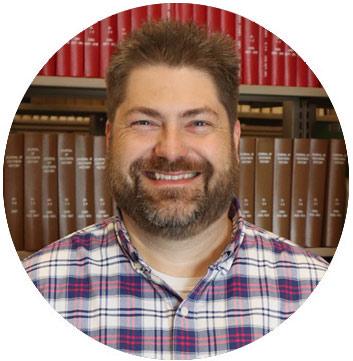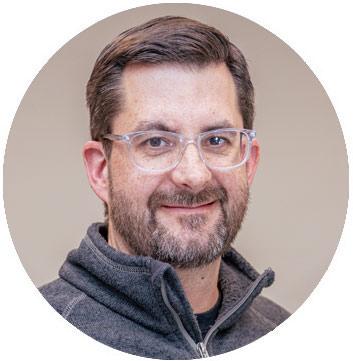The Research Technical Staff Award recognizes staff for their distinguished service to the University of Minnesota research community and celebrates exemplary leadership that positively impacted their colleagues and advanced the University's mission.
Each of the 10 recipients below was awarded a personal honorarium of $2,000. Selected quotes are taken directly from the nomination materials.

Jim Bjork is a research scientist (Researcher 3) in the Department of Biomedical Sciences, University of Minnesota Medical School, Duluth, and has worked for the University since 1998. He currently serves as the primary technical scientist at the Whiteside Institute for Clinical Research and as a technical assistant in the Heck Lab. He also supports research in the Department of Biomedical Sciences, managing and maintaining core equipment and instrumentation. He has expertise in many laboratory techniques including cell culture, molecular biology, microscopy, flow cytometry, and metabolic flux analysis and has participated in numerous research projects at all levels, including experimental design, method development, project management, and statistical analysis.
"Jim's impact on basic research has been long-standing and significant in the Department of Biomedical Sciences, spanning multiple decades. It is no exaggeration to say that his technical skills, scientific knowledge, and his ability to patiently train PIs, students, postdocs, and research staff in even the most complex experimental designs, the most advanced microscopic imaging techniques, or the use of a broad range of lab equipment have touched every lab in our department and beyond."

Melissa Blind has served as a senior research associate for the Memory Keepers Medical Discovery Team (MK-MDT) at the University of Minnesota Medical School, Duluth since 2017. She is currently the research coordinator for two large multi-site NIH grants with a collective value of $17 million. Dr. Blind previously served as a senior research associate at the Centre for Rural and Northern Health Research (CRaNHR) at Laurentian University in Ontario. She holds a PhD in American Indian Studies from University of Arizona.
"Dr. Blind’s contributions to research concerning cultural understanding of Indigenous populations with dementias are nothing short of exemplary. She was an essential figure in the first phase of a highly impactful project known as Indigenous Cultural Understandings of Alzheimer’s Disease and Related Dementias – Research and Engagement (ICARE) project. As a result of her exceptional work, the ICARE project was re-funded for another five years. Dr. Blind’s continued involvement is essential for the project’s success, where she continues her role in community-based researcher training and oversees project coordination and knowledge translation activities."

Juliet Burba has served as a grants developer for the Institute for Advanced Study, University of Minnesota Twin Cities since 2019. In this role, she collaborates with IAS-affiliated faculty and staff to develop grant-fundable projects, cultivate partners, seek funding opportunities, craft proposals, and coordinate submission of funding requests to internal and external funders. Successful submissions have ranged from $500 to $5 million. Prior to this role, Burba served as outreach historian and administrator for the Charles Babbage Institute and director of collections and exhibits at the Bakken Museum, both at the UMN Twin Cities. She holds a PhD in history of science and technology from the University of Minnesota.
"Juliet’s outstanding contribution to grant development greatly advances the University of Minnesota’s mission to address the most pressing social issues of our time. Juliet is a wonderful colleague whose ability to think nimbly and connect people across disciplines and system campuses has and will continue to enrich and transform the University. Her dedication and willingness to go the extra mile is rare and speaks to her commitment to greatly impact the University’s cutting-edge research and support stellar faculty. She is a truly exemplary model for this award."

Michael Corey has served as the geospatial, technology, and data lead/associate director of Mapping Prejudice, a project of the UMN Libraries, since 2021. In this role, he designs and maintains technical workflows for identifying and mapping racist housing covenants, oversees relationships with local records custodians, negotiates for access to records, and maintains and expands partnerships with community and academic co-creators. Corey holds a master of heritage studies and public history from the University of Minnesota.
"Michael is a visionary researcher and technologist who makes the nationally-renowned work of Mapping Prejudice possible. Since becoming the Mapping Prejudice geospatial, technical, and data lead, Michael has created a technical platform that has scaled up the capacity of the project, allowing it to attract funders and collaborators from all over the United States. This has established the University of Minnesota as the place to come for accessible racial covenant data and maps; technical support for identifying and mapping covenants; and guidance on how to advance community-powered mapping work to document structural racism. In the process, he has established himself as a national leader in transdisciplinary research collaborations. He is an extraordinarily versatile professional who is committed to the highest standards of work and deep collaboration with our interdisciplinary team."

Andrea Grant has served as the ultrahigh-field MRI manager and visual neuroimaging technologist for the Center for Magnetic Resonance Research, University of Minnesota Twin Cities since 2012. In this role, she conducts characterization and safety testing of RF coils during development and oversees human subject safety monitoring in accordance with FDA regulations. She also manages a database of historical safety approval requests and provides neuroimaging support for vision researchers. She previously held roles as a science teacher and research scientist in physics and environmental science. She holds a PhD in climatology from the Institute for Atmospheric and Climate Science, ETH Zurcich.
"Dr. Andrea Grant is a worldwide recognized leader in scanning humans at the highest MR fields. She is technical polyglot, actively participating in the design/test/implement cycle of new MRI coil array designs while training new users on MR equipment and overseeing the maintenance of peripheral equipment (a task she inherited from her previous position on a NIH core grant supporting teams that do functional MRI research of the human visual system). Without Andrea’s professional excellence, her dedication to the CMRR and the University of Minnesota, and her extensive technical and interpersonal skills, we would not have been able to acquire, and for the first-time show, submicron volume functional human brain maps. This technology has the potential to revolutionize in-vivo neuroscience and will keep the University of Minnesota, for the coming decade, solidly in a worldwide leadership position. Andrea is a key staff researcher at the heart of this larger effort and richly deserves official recognition for her decade long dedication and excellence."

Erin Lind serves as a research project specialist in the Department of Neuroscience, director of the Mouse Behavior Core in the Institute of Translational Neuroscience, and associate director of the MnDRIVE Optogenetics and Neuromodulation Core. In these roles, Lind supports preclinical research, provides academic and technical support, troubleshoots obstacles, and promotes research advancements across multiple scientific fields. She has worked with over 60 labs across 20 departments, providing support across 10 buildings throughout the Twin Cities campus. She is active on the IACUC protocols of 26 PIs and is also PI on her own IACUC/IBC/CS protocols for training core staff and testing new approaches and procedures. Lind holds a PhD in neuroscience from the University of Minnesota.
"Erin is a true team player and goes above and beyond to help ensure the needs of the research community are met. If she sees an area that needs attention or a need that hasn’t been met, she finds a way to take care of it. If a lab needs help, even in areas outside of her cores or job description, she strives to accommodate them. If she doesn’t know how to do something, she figures out a way to learn it. If she doesn’t have the answer, she connects you with someone who does. In brief, our research environment is a considerably richer one with Erin as a part of it."

Todd Markowski has served as a senior scientist in the Center for Metabolomics and Proteomics in the College of Biological Sciences since 2004. In that role, he provides mass spectrometry analysis of proteins, peptides, and small molecules, including direct consultation with PI's and researchers on experimental design, method development, and data analysis. Markowski also serves as the operations manager of the CMSP sample preparation lab, directing junior sample preparation staff, inventory tracking, ordering, SOP training for graduate students and postdocs, and method development for analytical needs. Markowski has also educated a countless number of researchers and undergraduates through the CMSP's Metabolomics and Proteomics workshop and BioC4325 class offerings.
"Todd has been a tremendous asset for the UMN. He has not only helped advance the CMSP in many aspects, but his unique skill set has allowed many investigators to accelerate their science. He is really a great person to work with, and a true team player. If there is any question or concern, I can always email Todd and he will get back to me with an answer or a resource. I have probably had more than 30 Zoom meetings with Todd about different projects, and I can honestly say they are all extremely pleasant and highly useful."

James Marti has served as a senior scientist at the Minnesota Nano Center in the College of Science and Engineering since 2008. In this role he provides scientific and day-to-day leadership of core laboratories supporting nanoscience research, including working with faculty to expand lab capabilities, managing interactions with academic and industrial lab users, and developing extensive educational programming on nanoscience for middle school to college level students. Marti also planned two new multi-user laboratories, including specifying and installing instrumentation, establishing calibration procedures and workflows, and developing quality assurance and safety plans. He holds a PhD in physics from the University of Minnesota.
"Jim’s contributions to this facility have been profound and consistent. Over the past nine years, Jim has overseen the training of nearly 500 lab users, both from academia and industry. Furthermore, since these labs were set up, they have become an integral part of the process offerings of the Nano Center, and helped the University compete for, and win, two successive large NSF grants that support Nano Center operations. Specifically, in 2015 and again in 2020, the University has been awarded a combined total of $9.5 million in funding through the National Nanotechnology Coordinated Infrastructure (NNCI), where the labs that Jim runs have played an integral role in obtaining this funding. As recognition for his contributions to the NNCI, last year, Jim was awarded the Outstanding NNCI Staff Award in the technical staff category."

Abbey Staugaitis serves several roles within the University of Minnesota Medical School including project manager of two National Institutes of Health (NIH)-funded clinical trial networks (SIREN and StrokeNet), project manager for the Acute Care Research Coordinator (ACRC) group, and co-director of the UMN Stroke Research Fellowship. She also serves as the StrokeNet Telemedicine and Remote Research Advisory co-chair. Staugaitis holds a master of science in nursing from Drexel University.
"Abbey's continual dedication to research has set her apart from others in her field. Her professional success and the success of the UMN research department are not only due to her knowledge and work ethic but also her kind and caring nature. Principal investigators from multiple departments within the UMN seek her team's services. Abbey has led her team in coordination of a variety of multicenter national and international clinical trials, of which the UMN and her team were top enrollers in three clinical research trials, garnering notoriety and recognition for the UMN."

Victor Young has served as director of the X-Ray Crystallographic Laboratory (XCL) in the Department of Chemistry since 1995. In this role, he provides essential research products, including highly-accurate three-dimensional models of experimentally-determined crystal structures, to support the externally-funded research programs of faculty, graduate students, and postdoctoral fellows throughout the University. Young has also helped XCL to acquire funding for its research infrastructure and instrumentation. Young holds a PhD in inorganic chemistry from Arizona State University.
"In his time at UMN, Vic has helped to solve literally thousands of structures that underpin our basic understanding of bioinorganic chemistry, catalytic chemistry, organic chemistry, and more—all while teaching X-ray crystallography basics to generations of students. Vic has co-authored over 300 journal articles with faculty at UMN and across the country. Vic is perhaps the most prolific and well-known living crystallographer in the US. He has literally put UMN on the map within several disciplines of chemistry with his expertise and prowess in crystallography. Further, students who work with Vic are prized for their crystallography skills, and Vic has helped place many of our graduate students into full-time careers in crystallography, even if their “specialization” at UMN has been in something else!"